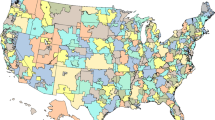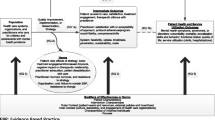Abstract
The Fort Bragg Evaluation Project (FBEP) showed that children in a well implemented and expensive continuum of care had no better clinical outcomes than those experiencing more traditional and fragmented services. In an article published in this journal that was critical of the evaluation, Mordock argued that the FBEP results be viewed with skepticism because of what he perceived to be methodological, design, measurement, and analytic failures of this study. We think it is important to respond to Mordock's critique since it contributes to the great reluctance to seriously consider the study's findings and their implications.
Similar content being viewed by others
References
Bickman L, Guthrie PR, Foster EM, Lambert EW, Summerfelt WT, Breda CS, Heflinger CA: Evaluating Managed Mental Health Services: The Fort Bragg Experiment. New York: Plenum, 1995.
Heflinger CA: Final Report of the Fort Bragg Evaluation: The Implementation Study. Nashville: Vanderbilt University Center for Mental Health Policy, 1993.
Summerfelt WT, Foster EM, Saunders RC: Mental health services utilization in a children's mental health managed care demonstration. J Mntl Hlth Admin 23:80–91, 1996.
Heflinger CA, Sonnichsen SE, Brannan AM: Parent satisfaction with children's mental health services in a children's mental health managed care demonstration. J Mntl Hlth Admin 23:69–79, 1996.
Bickman L: A managed continuum of care: more is not better. Amer Psycholog 51:689–701, 1996.
Lambert EW, Guthrie PR: Clinical outcomes of a children's mental health managed care demonstration. J Mntl Hlth Admin 23:51–68, 1996.
Foster EM, Summerfelt WT, Saunders RC: The costs of mental health services under the Fort Bragg Demonstration. J Mntl Hlth Admin 23:92–106, 1996.
Bickman L, Summerfelt WT, Noser K: Comparative outcomes of emotionally disturbed children and adolescents in a system of services and usual care. Psychiatric Services, 48(12), 1543–1548, 1997.
Hamner K, Lambert E, Bickman L: Children's mental health in a continuum of care: clinical outcomes at 18 months for the Bragg Demonstration. Journal of Mental Health Administration, 24(4), 664–670, 1997.
Salzer MS, Bickman L: Delivering effective children's services in the community: Reconsidering the benefits of system interventions. App Prev Psychol 6:1–13, 1997.
Mordock JB: The Fort Bragg Continuum of Care Demonstration Project: The population served was unique and the outcomes are questionable. Child Psychiat Human Dev, 27:241–254, 1997.
Behar L: The Fort Bragg Evaluation: A snapshot in time, Am Psychology, 52:557–559, 1997.
Burchard JD: Evaluation of the Fort Bragg managed care experiment. J Child Fam Studies 5:173–176, 1996.
DeLeon PW, Williams, JG: Evaluation research and public policy formation: are we collectively willing to accept unpopular findings? Am Psycholog, 52:551–552, 1997.
Evans ME, Banks SM: The Fort Bragg managed care experiment. J Child Fam Studies 5:169–172, 1996.
Feldman S: The Fort Bragg Demonstration and Evaluation: a commentary. Am Psycholog, 52:560–561, 1997.
Friedman RM: The Fort Bragg study: what can we conclude? J Child Fam Studies 5:161–168, 1996.
Friedman RM, Burns BJ: The evaluation of the Fort Bragg Demonstration Project: an alternative interpretation of the findings. J Men Hlth Admin 23:128–136, 1996.
Henggeler SW, Schoenwald SK, Munger RL: Families and therapists achieve clinical outcomes, systems of care mediate the process. J Child Fam Studies 5:177–183, 1996.
Hoagwood K: Interpreting nullity: the Fort Bragg Experiment—A comparative success or failure? Amer Psycholog, 52:546–550, 1997.
Kingdon DW, Ichinose CK: The Fort Bragg managed care experiment: what do the results mean for publicly funded systems of care? J Child Fam Studies 5:191–195, 1996.
Saxe L, Cross TP: Interpreting the Fort Bragg Children's Mental Health Demonstration: the cup is half full. Amer Psycholog, 52:553–559, 1997.
Sechrest L, Walsh M: Dogma or data: bragging rights. Am Psycholog, 52:536–540, 1997.
Weisz JR, Han SS, Valeri SM: What can we learn from Fort Bragg. J Child Fam Studies 5(2):185–190, 1996.
Weisz JR, Han SS, Valeri SM: More of what? Issues raised by Fort Bragg. Amer Psycholog, 52:541–545, 1997.
Bickman L: Reinterpreting the Fort Bragg Evaluation findings: the message does not change. J Mntl Health Admin 23:137–45, 1996.
Bickman L: Resolving issues raised by the Fort Bragg Evaluation: new directions for mental health services research. Amer Psycholog, 52:562–565, 1997.
Bickman L, Lambert EW, Summerfelt WT, Heflinger CA: Rejoinder to questions about the Fort Bragg Evaluation. J Child Fam Studies 5:197–206, 1996.
Bickman L, Summerfelt WT, Firth JM, Douglas SM: The Stark County Evaluation Project: baseline results of a randomized experiment. In Evaluating Mental Health Services. How Do Programs for Children “Work” in the Real World? Nixon, CT., Northrup, DA, eds. Thousand Oaks, CA: Sage, 1997.
Campbell DT, Stanley JC: Experimental and quasi-experimental designs for research. Chicago, IL: Rand McNally, 1966.
Bickman L, Rog D (eds.): Handbook of Applied Social Research Methods, Newbury Park, CA: Sage, 1997.
Breda CS: Methodological issues in evaluating mental health outcomes of a children's mental health managed care demonstration. J Mntl Hlth Admin 23:40–50, 1996.
Foster EM, Bickman, L. Attrition from the Fort Bragg study: implications for measured effectiveness. Eval Rev 20:695–723, 1996.
Bickman L, Guthrie PR, Foster EM, Lambert EW, Summerfelt WT, Breda CS, Heflinger CA: Final report of the outcome and cost/utilization studies of the Fort Bragg Evaluation Project (Vol 1). VIPPS, Center for Mental Health Policy. Nashville, TN, 1994.
Kazdin AE, Mazurick JL, Siegel TC: Treatment outcome among children with externalizing disorder who terminate prematurely versus those who complete therapy. J Amer Acad Child Adol Psychiat 33:549–557, 1994.
Mordock JB: Utilization rates in children's mental health systems: more evidence for the “clinician's illusion?” Clin Child Psychology Psychiat, in press.
Summerfelt WT, Salzer M, Bickman L: Interpreting differential rates of service use: avoiding myopia. Clin Child Psycholog Psychiat 2(4), 591–595, 1997.
Lipsey MW, Wilson DB: The efficacy of psychological, educational, and behavioral treatment: confirmation from meta-analysis. Am Psycholog 48:1181–1209, 1993.
Orlinsky DE, Grawe K, Parks BK: Process and outcome in psychotherapy. In Bergin, AE, Garfield, SL: Handbook of Psychotherapy and Behavior Change (4th ed., pp.270–376). New York, NY: John Wiley & Sons, Inc., 1994.
Fonagy P, Target M: The efficacy of psychoanalysis for children with disruptive disorders. J Amer Acad of Child Adoles Psychiat 33:45–55, 1994.
Target M, Fonagy P: The efficacy of psychoanalysis for children with emotional disorders. J Amer Acad Child Adol Psychiatr 33:361–371, 1994.
Target M, Fonagy P: The efficacy of psychoanalysis for children: Prediction of outcome in a developmental context. J Amer Acad Child Adol Psychiatr 33:1134–1144, 1994.
Smyrnios KX, Kirby RJ: Long-term comparison of brief versus unlimited psychodynamic treatments with children and their parents. J Cons Clin Psycholog 61:1020–1027, 1993.
Kazdin AE, Siegel TC, Bass D: Cognitive problem-solving skills training and parent management training in the treatment of antisocial behavior in children. J Cons Clin Psycholog 60:733–747, 1992.
Salzer MS, Bickman L: The errors of using retention in services as an indicator of quality. Poster presented at the NIMH International Conference on Mental Health Services Research. Washington, DC, September, 1995.
Lambert W, Salzer MS, Bickman L: Clinical outcome, consumer satisfaction, and ad hoc ratings of improvement. J Consulting Clin Psycholog 66(2), 270–279, 1998.
Author information
Authors and Affiliations
Rights and permissions
About this article
Cite this article
Bickman, L., Salzer, M.S., Lambert, E.W. et al. Rejoinder to Mordock's Critique of the Fort Bragg Evaluation Project: The Sample Is Generalizable and the Outcomes Are Clear. Child Psychiatry Hum Dev 29, 77–91 (1998). https://doi.org/10.1023/A:1022687331435
Issue Date:
DOI: https://doi.org/10.1023/A:1022687331435




